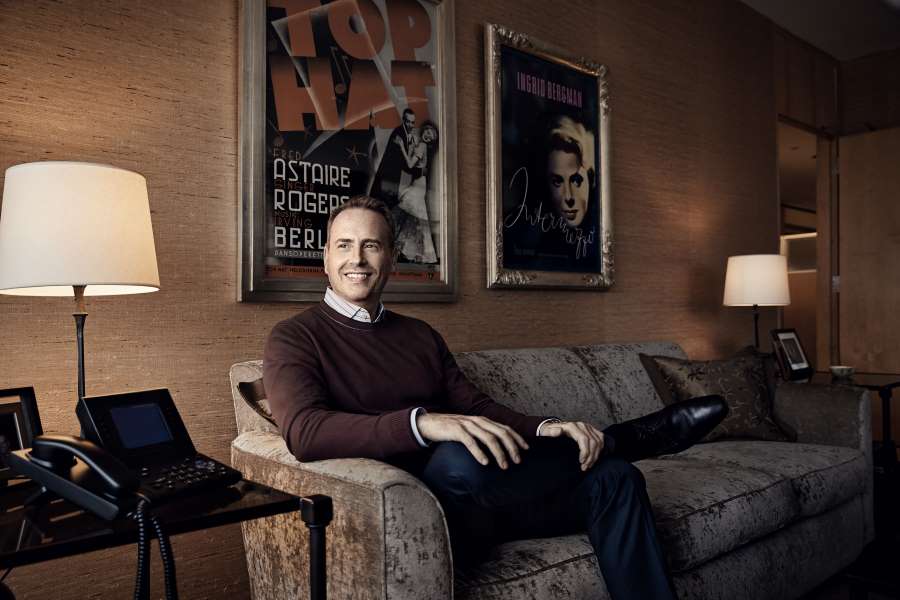When Leslie Odom Jr. was cast in Hamilton, he wasn’t sure if he would be able to do it. A pilot he’d recently shot for NBC had just been picked up to series, and filming would conflict with the show’s run at the Public Theater in 2015. So he called up Robert Greenblatt, the chairman of NBC Entertainment, and made his plea.
Greenblatt let him out of his contract, no questions asked, but he didn’t stop there—he also wanted to be involved. So he spent the next few months hounding the producers to become an investor in Hamilton. (He finally wore them down.)
Greenblatt, known to everyone as “Bob,” has spent his entire career in television, first at Fox, then at Showtime, and now at NBCUniversal, but his first love is theatre. He played piano for shows in high school in Rockford, Ill., alongside Joe Mantello and Marin Mazzie—he keeps in touch with his hometown friends to this day—and he studied theatre management in college and arts administration in graduate school.
“I thought I was going to be a theatre producer, but I really couldn’t figure out how you become a theatre producer,” said Greenblatt, sitting in his corner office, which looks out over the Universal backlot. “When you go to theatre school, you train to be a director or a writer or an actor or a designer, but producer is kind of an amorphous thing that you really don’t train people for.”
Now he is a producer, but not in the way he expected. From investing in and producing shows (currently, Broadway’s Dear Evan Hansen) to putting theatrical stories and original music on TV with “Smash” to bringing movies to Broadway with Universal Stage Productions to reviving live broadcast musicals (the fourth edition, “Hairspray Live!,” aired on Dec. 7), it’s a wonder he has time to work on his day job programming TV.
His office is full of theatre memorabilia, from the Hamilton book and Playbills on his coffee table to the piano in the corner. (He famously accompanied Dolly Parton at NBC’s season presentation to advertisers, aka “upfront,” in 2015.) His demeanor is warm and inviting—there are bowls of candy outside his office for visitors—and he speaks candidly about his projects.
“Our common language was theatre,” said Neil Meron, executive producer of “Hairspray Live!” and “Smash.” “There are very few people out here in Hollywood who understand both genres.”
Meron and his partner Craig Zadan have worked with Greenblatt on all of the live musical broadcasts on NBC, but initially Greenblatt approached them about doing a new TV movie version of Oklahoma! starring Hugh Jackman. Zadan and Meron countered with the idea to do a live broadcast of The Sound of Music, as the producers had already done many made-for-TV musical movies (Gypsy with Bette Midler, Annie with Kathy Bates) and blockbuster film musicals (Chicago).
“He didn’t say, ‘Let me think about it.’ He said, ‘When can you get this up and running? Go do it,’” Zadan said, adding that Greenblatt feels more like a third producer and collaborator in the live musical efforts than the head of the network. “And that’s very much the way Bob is. He’s so instinctive and he’s such a risk taker.”
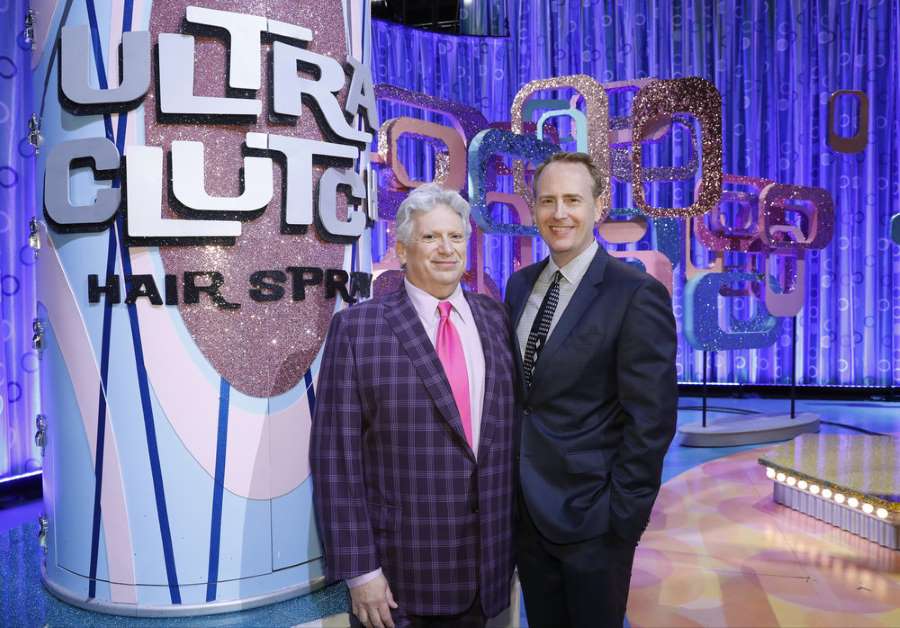
Zadan and Meron are also making a foray onto Broadway with Greenblatt with Bombshell, the fictional Marilyn Monroe musical from “Smash,” through Universal Stage Productions (USP), the theatrical arm of the network that Greenblatt runs alongside Universal Pictures president Jimmy Horowitz. The company currently has Holiday Inn on Broadway with Roundabout Theatre Company, which runs Sept. 1, 2016-Jan. 15, 2017, and coproduced October Sky at San Diego’s Old Globe Theater, which ran Sept. 10-Oct. 23.
“We’re in touch a lot, in a theatre-geek kind of way,” said Chris Herzberger, who runs the day-to-day of USP as vice president, live theatricals. “I appreciate the accessibility. For someone who is running this major network, he’s able to devote to theatre 100 percent of the passion that he has for it.” And while Greenblatt’s high-level contacts are “really, really helpful,” Herzberger added that the network head “also has very unique dramaturgical insight. He’s an expert at storytelling.”
The relationships are key to his success. The first Broadway show he invested in was The Drowsy Chaperone, and now the star and book writer, Bob Martin, is writing the book for a musical adaptation of The Sting for USP. Chaperone was produced by Kevin McCollum, who also produced Something Rotten!, which Greenblatt was involved in (and which starred “Smash” regular Christian Borle). McCollum used to be producing partners with Jeffrey Seller, of the omnipresent Hamilton, who is also working on TV projects for NBC. Greenblatt’s first show as a lead producer was 9 to 5, which was choreographed by Andy Blankenbuehler and co-arranged and co-orchestrated by Alex Lacamoire, both of Hamilton. And he met Justin Paul and Benj Pasek, who wrote Dear Evan Hansen, when they wrote music for the second season of “Smash.”
Jerry Mitchell actually met Greenblatt for the first time in the theatre at the final performance of A Gentleman’s Guide to Love and Murder, for which Greenblatt won a Tony Award as one of the producers. Mitchell was sitting near him and remembers chatting about the possibility of working together on “Hairspray Live!” Mitchell is choreographing the broadcast. “Shows like this can’t happen unless there’s someone with a passion to get live theatre to the small screen,” says Mitchell.
For Greenblatt, the television platform—and the wide audience it reaches—is the reason he’ll never work exclusively in theatre. “It’d be great to have a huge success on Broadway and run for years,” he said, but his sights are set higher. “I did the math on Sound of Music; I did a 1,500-seat Broadway theatre and I did eight shows a week. How long would it run to even come close to Sound of Music’s one-night audience? Thirty-nine years.” With TV broadcasts, “Broadway musicals are in people’s living rooms in a way that they had never been before. I love having that big national platform. And I can also do Evan Hansen. So I kind of can do it all.”
After a tour of the Universal backlot and a glance at a dance rehearsal, I sat down with Greenblatt in Los Angeles in October as rehearsals were starting for “Hairspray Live!”
You have degrees in theatre and arts management. How did you get into TV?
I always thought I want to go to New York and become a theatre producer, but I guess I realized early on you have to have a property or you have to have something that you’re actually going to produce. I simultaneously was really fascinated with the movie business as a kid, so I eventually came out to L.A. and went to film school. After film school, I got a job right away with somebody who went on to become very iconic in our business (Peter Chernin) and we were in movies initially but then he quickly moved into a TV job at the Fox Network, which was a young company at the time. And he said, “You should come to the Fox Network and work for me in television.” That wasn’t even in my thinking. It was either theatre or movies. TV was not the No. 1 choice, but I did that. And never did anything since.
You have a musical background—there’s even a piano in your office. Did you ever consider a creative path?
No. I’m not a writer. I love to play, I’m a musician. But I would never want to do that professionally and I never want to get onstage. That was the worst possible thing I could think of. But I love playing in orchestras. I love being behind the scenes.
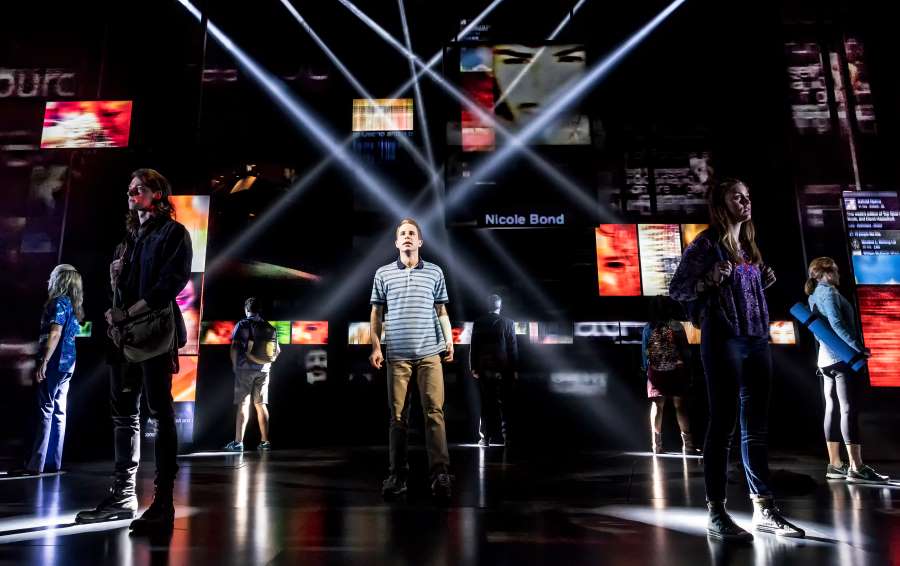
You’re about to do your fourth live musical with “Hairspray Live!,” and it’s the first time you’re doing one in L.A. How did that come about?
Every year we try to up the ante a little bit. Hairspray is a big, loud, fun show. It shouldn’t be stuck in a dark stage. And we have this big backlot, and at the time, we thought we were going to get a tax credit in L.A. The reason we went to New York is because you get a tax credit to do it in New York and the talent is there, but these movies are so expensive that the tax credit is really important. And we ended up not getting the tax credit because—it’s all complicated. But we thought, let’s move it to the West Coast and use the backlot. We also saw what “Grease: Live” did [on Fox]. It was really fun and open and airy even though it rained. And we thought, let’s just do it in a big, expansive way.
You’re having a live audience this year too, which “Grease: Live” also did.
We are. I always like qualify that, because I think you have to make the audience reactions feel organic. They’ve been making movie musicals for 80 years and there was never an audience in a movie musical. So when everybody kept going on and on about, “Why didn’t you have a live audience on the The Wiz?” Well, it’s a movie. Yes, it’s a live movie, but it’s still a movie. We’re not doing it in an open-air park where people are coming. And I think there’s such a negative backlash to people who hear laugh tracks on sitcoms, so we thought if you just heard hooting and hollering from somewhere, it would be weird. It didn’t really work for us. “Grease: Live” did it appropriately—although a bunch of times they had people sitting on bleachers, and I don’t know who those people were. There were numbers where they were in contained sets and I heard people applauding and I was like, “Who are those people?”
What we’re trying to do is where it’s organic, where there would be extras and bystanders and people in the world looking on who could react to the musical number, then you’ll hear applause. I don’t think you’re going to hear it, though, if there’s a lovely intimate song in a room. But you’re going to hear it on the streets in “Good Morning, Baltimore.” There will people on the streets who are actually reacting to her and applauding. Half of the show takes place at the “Corny Collins Show,” which is a TV show with an audience. So when you see an audience in that studio, you’ll go, “Oh yeah, there are people in the world of the show.”
With so much TV being streamed online, is live-event television a way for you to get ratings?
It is a way to get people to watch at a time when you need them to watch as opposed to whenever they want to. We’ve seen from these musicals that the initial airing is huge, and then the three-day delay is relatively small compared to most other television, because people want to be part of the night that it’s on. I just love people going, “Oh my God, I’m going home tonight to watch the show with my family and we’re having everybody over.” Does that mean there’s going to be a whole bunch of live events happening? I don’t know—they’re really hard to pull off.
We’re trying to do some live theatre also, not just musicals, like A Few Good Men, which we haven’t figured out when we’re going to do it yet because we’re still waiting on the right casting. And it’s tricky because you can’t just cast it and shoot it when it’s convenient for them. You have to cast it according to when you’re going to air it. So you kind of have to back into a date. There are a lot of people we approached on Sound of Music early on who were absolutely adamantly against even considering a live musical. I’m happy to say that’s changed because we’ve proven it’s not the most horrendous, scary thing in the world. And second, there were some people who were interested in doing it but I needed them from October to December and they weren’t available. The bigger the star, the less availability they have. It becomes really tricky to cast these things. The fact that “Hairspray” came together the way it did is kind of amazing.
It seems like a lot of work to put into a one-night airing—you basically have to do a full rehearsal process for a show that’s only going to go up once. What’s the business model?
It’s largely advertiser-based. The rating is big enough because you can amass a large audience that you can make a fair amount of money that makes you a little bit of money at the end of the day. This isn’t a cash cow. Money doesn’t flow in. These things are huge—hundreds of people are involved. You need to buy the rights. You need to build the scenery. It’s labor-intensive. It’s weeks of rehearsals. So it’s all advertising. There’s little bits of things we can do with certain advertisers that will pay premiums; we’re doing some branded content. There’s no merchandising. We sell CDs and DVDs of these but it’s not a big part of the business. People like to watch it live and that’s the experience. It was never meant to be, “We’ve figured out a way to make a new business model to make a ton of money.” It was like, “How do we do this live event that will become a big deal for the network?” I think it’s become one of our signature moves, but that’s what’s worth it. Not, “Oh, we made $50 million.” For that we do theme park rides and “The Voice.”
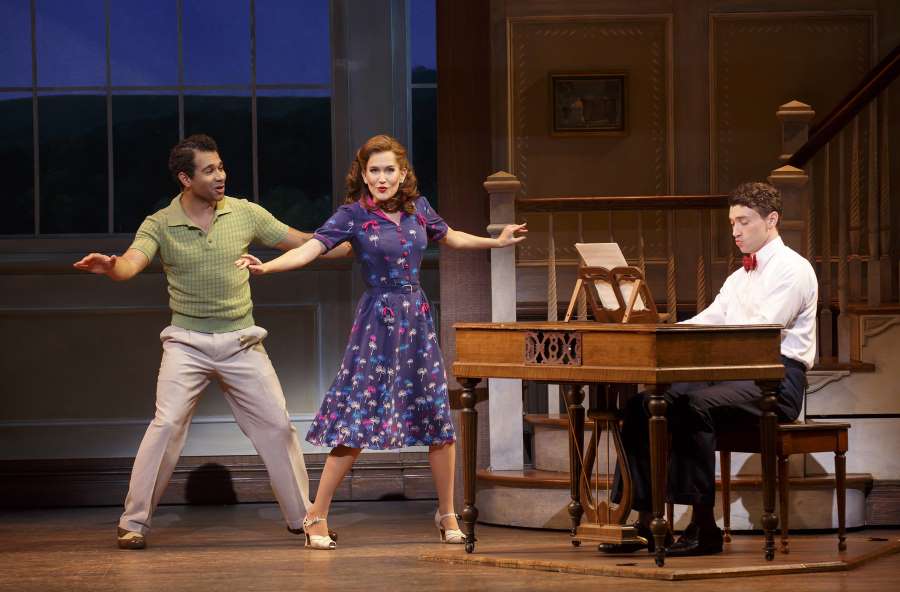
You found a cult following with “Smash,” but the show wasn’t a huge success, and now there are many musicals on TV — “Crazy Ex-Girlfriend,” “Galavant.” Do you think the audience is growing for that?
I don’t know if there’s a growing audience, but I think for the right thing, you can do it. I think they’re tricky. I am totally open to trying to find another one. I don’t think it should be anything like “Smash,” because I think we did it. I’m working on something with Jeffrey Seller that I’m excited about. I wouldn’t even call it a musical, but there’s musicals in it. “Crazy Ex-Girlfriend” I think is really unique and fun, and I think [Rachel Bloom] is a real talent. And that’s a great way to do it. I don’t know if the next big hit broadcast show is going to be a musical.
“Glee” did pretty well.
Yeah, it burned brightly for a couple of seasons, but I give them a lot of credit for doing it and producing a lot of music. We wanted to challenge ourselves with the original score [on “Smash”], which is why Scott [Wittman] and Marc [Shaiman] were involved. Hopefully we’re going to do Bombshell for Broadway.
And The Wiz is also hoping to come to Broadway. Is your goal to bring live broadcasts to the stage?
There’s really no strategy in mind, because these are rarefied things and I don’t think they’ll ever fit into, “Oh, here’s our plan.” Disney does it, and I have to give them credit for it because they’ve got that Lion King cash cow, which fuels their whole business. They’ve got all those animated musicals that they’re so good at putting onstage, and every few years they do another one and it keeps going and going and going. It’s unique. We don’t generate that intellectual property that has musicals, and I wish that we did. But I don’t think you can go, “Oh, Disney did it this way so we’re going to try it this way.” It’s really opportunistic. You have to look at each show and think, could that work?
With Universal Stage Productions, your strategy seems to be to partner with nonprofit theatres. Holiday Inn is with Roundabout, October Sky at the Old Globe. What do you like about working with resident theatres?
What’s great about that is for very little investment, we can get a full production and basically see what it is. We can do readings and workshops all day long, but to see a full production is very valuable. And I think these regional theatres are very much in the market for getting their hands on something commercial, and if there’s a pre-sold title that can be very attractive to them. Roundabout has never done an original musical; they’ve only done revivals. I think they were looking at, maybe this could be a great next step for us because our 40,000 subscribers usually expect a revival. This kind of feels like it could be a revival because people know the movie and Irving Berlin, but it’s never been done before, so it’s like a nice baby step forward. And we were thrilled that they wanted to do it. It gives us the opportunity to do a production on Broadway that doesn’t cost $15 million. We partnered with them. It’s their production. We usually enhance those productions a little bit so they can do things a little bit bigger than they would normally do.
In the case of October Sky, it’s a fully rendered production. It cost a fraction to do than to rent a theatre in Chicago to mount the full production. Then we can step back and think, are we ready to go to the next step? I want to do more of that with regional theatres.
Everyone goes, “You want to go to Broadway.” Well, not necessarily. Because unless you have a really sure thing, Broadway’s expensive—even in success. Gentleman’s Guide won best musical, was the best reviewed show of the year, ran for almost two years on Broadway, and made a little bit of money. It was a little show. There are people who said it probably shouldn’t have been a Broadway show. There’s not a lot of upside with a Broadway show unless you can really get into that upper tier. That doesn’t mean you can’t do Holiday Inn at Roundabout and then go on tour and then license it and it’s a huge success.
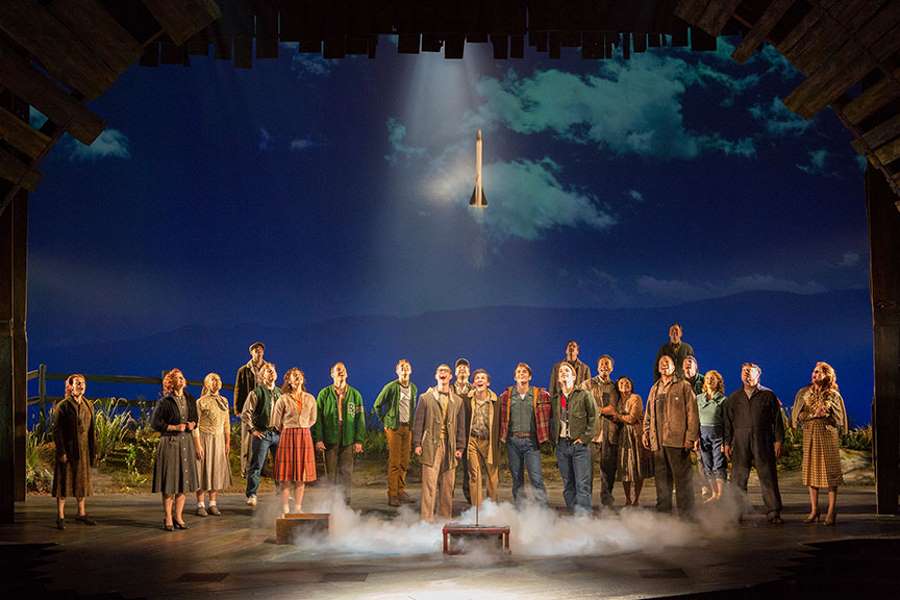
How do you find writers to pair with projects with Universal Stage Productions?
It’s same process you go through with any kind of development. Usually we start with a producer; we’re not just producing it ourselves, so we use a theatre producer who comes to us or we know them all and we’ll say, “What about this?” And then it’s just a matter of going through the list of composers and book writers and trying to figure out who would be the best to do it or who would consider doing it. We pitch it to them. That’s the trickiest process because there’s no rhyme or reason to it. Usually if somebody puts their hand up and says, “I really want this,” that’s a compelling reason to go in that direction. It’s a mystery how you get the right people to do it.
Would you ever leave TV to go work in theatre?
I don’t think I could ever walk away from the TV business, which I love and have been doing for so long. I kind of have the best of all of the worlds, right? I’m personally doing Broadway shows on my own. I’m doing shows with a big corporate entity. I’m doing Broadway musicals on television. And I don’t know any better combination of elements.

